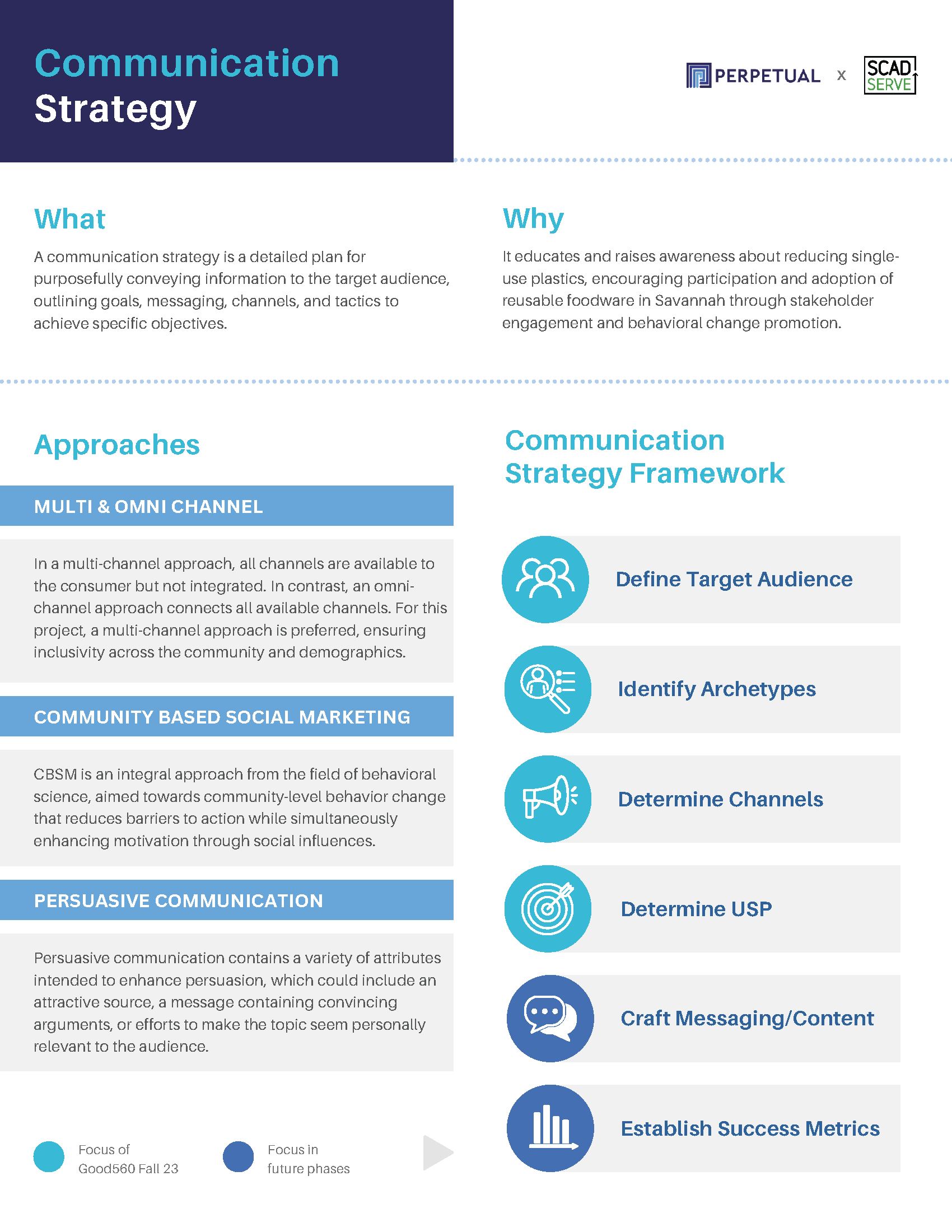Objective
Our goal was to familiarize ourselves with the concept of reusable foodware and investigate the overall attitudes and behaviors of Savannah consumers regarding the reuse program. Develop a body of primary research on the attitudes and behaviors of the Savannah community toward reusable food containers and food ware systems, and craft a preliminary communications strategy to assist Perpetual in catalyzing local stakeholder engagement and commitments.
Project deliverables -
Savannah Overview
Consumer Surveys
Resident Interviews
Cultural Probes
Proposed Communication Strategy
Identified Unique Selling Points (USP)
The Team
Secondary research
The team conducted comprehensive secondary research on Savannah, focusing on several key areas. We examined demographic data for Chatham County and the broader Coastal Empire region, including population statistics, racial and ethnic breakdown, generational makeup, and workforce characteristics. The research also covered Savannah's economic landscape, particularly its tourism sector, providing insights into visitor numbers, economic impact, and employment growth. Additionally, the team analyzed population growth trends, commuting patterns, and residential areas. We looked into Savannah's unique features like the open container policy and the Waterfront District. This thorough approach allowed us to gain a holistic understanding of Savannah's socio-economic context and its potential implications for implementing a reusable foodware program.
primary research
The team conducted extensive primary research in Savannah using multiple methods. We carried out surveys distributed via social media, email/text, and QR codes posted around the city, gathering 100 responses. The team also conducted interviews and held meetings with various stakeholders. Cultural probe activities were implemented, including a Cup of Choice Experiment, To-Go Cup Mapping, and a slogan selection activity. These probes were conducted at four key locations: Farmers Market, Oktoberfest, Earth-Conscious Expo, and Superbloom, engaging different age groups of locals and visitors. Additionally, we performed consumer interviews across various neighborhoods in Savannah. This multi-faceted approach allowed us to gather insights on current take-out patterns, sustainability awareness, willingness to participate in reusable programs, and potential barriers to adoption.
After a deep dive into observations and cultural probes to gain nuanced insights into local behaviors and culture, we analyzed communication patterns to develop effective community engagement strategies. Our team also conducted an in-depth study of the return experience to optimize system usability. We planned to create an ecosystem visualization, mapping out all stakeholders and processes involved. Finally, we developed a tailored community communication strategy to ensure effective outreach and adoption of our reusable program. Through this comprehensive approach, we aimed to address both the technical and social aspects of implementing our system, ensuring its success within Savannah's unique context.
Communication Strategy
We conducted a comprehensive workshop with the Perpetual team, stakeholders from the City of Savannah, and local businesses who will be implementing our reusable system. During this workshop, we presented a detailed run-through of our secondary and primary research findings. We shared our insights from Perpetual's Value Study, our observations, and cultural probes that helped us understand Savannah's unique context. We also discussed the communication patterns we had analyzed and presented our proposed communication strategies tailored for the Savannah community.
A key focus was on our ecosystem visualization, which mapped out all the stakeholders and processes involved. We used this to facilitate discussions on the in-depth return experience study and how we could optimize the system's usability. Together with the workshop participants, we refined our community communication strategy to ensure effective outreach and adoption of the reusable program.
This collaborative approach allowed us to leverage the local knowledge and expertise of our Savannah partners, ensuring that our implementation plan was well-aligned with the city's needs and culture. By the end of the workshop, we had developed a clear, actionable plan for moving forward with the implementation of our reusable system in Savannah.
Looking ahead
This is only the beginning...
Our research and approach serve as a foundation for developing an education initiative aimed at enhancing public understanding and changing perceptions about the reuse program. Identifying and addressing the barriers that may hinder the adoption of the reuse program is equally important. We can overcome the barriers by employing a comprehensive communication strategy incorporating various channels and educational messages tailored to different adopter categories.
The reuse program not only encourages behavioral change but also contributes to a collective effort in building a more sustainable Savannah community





















